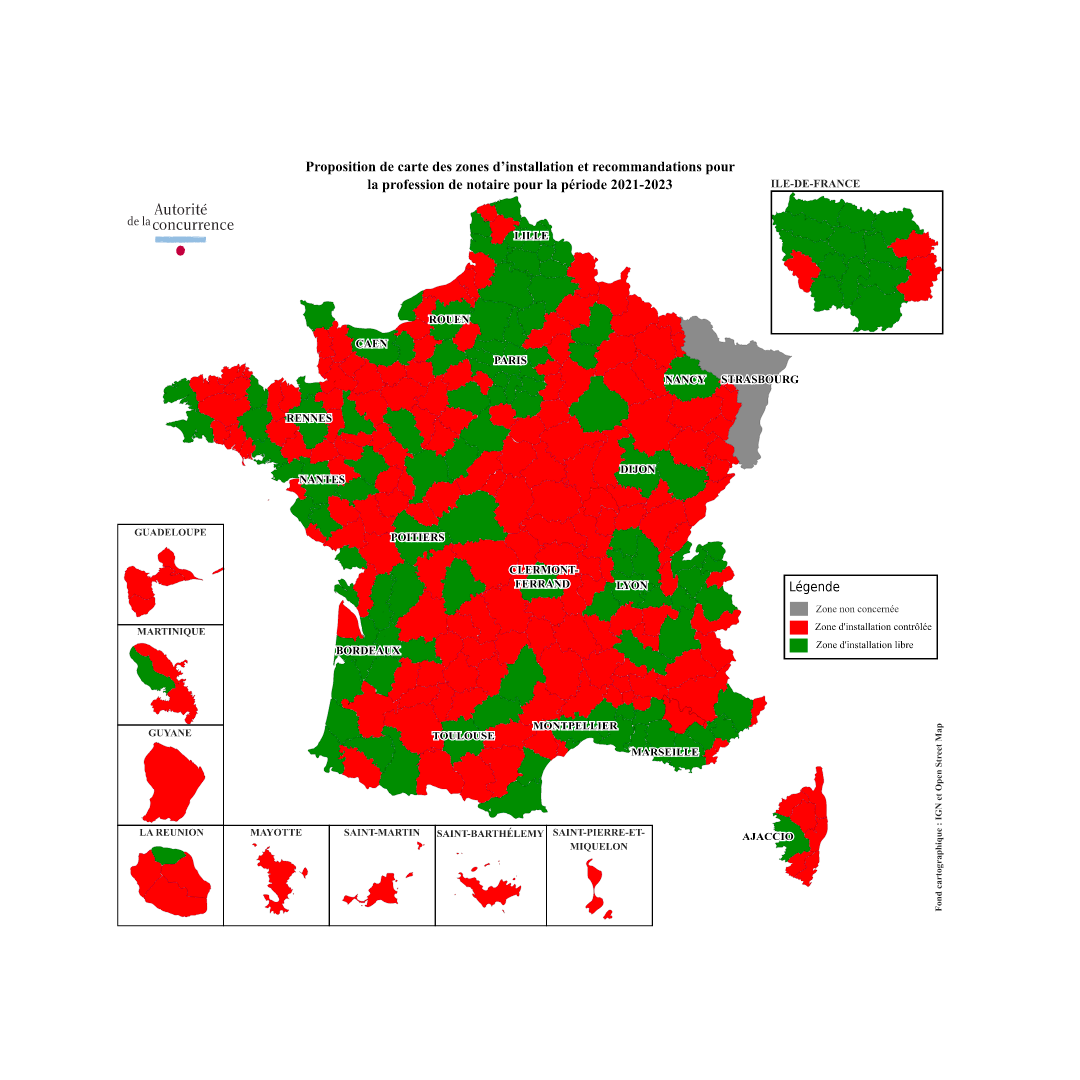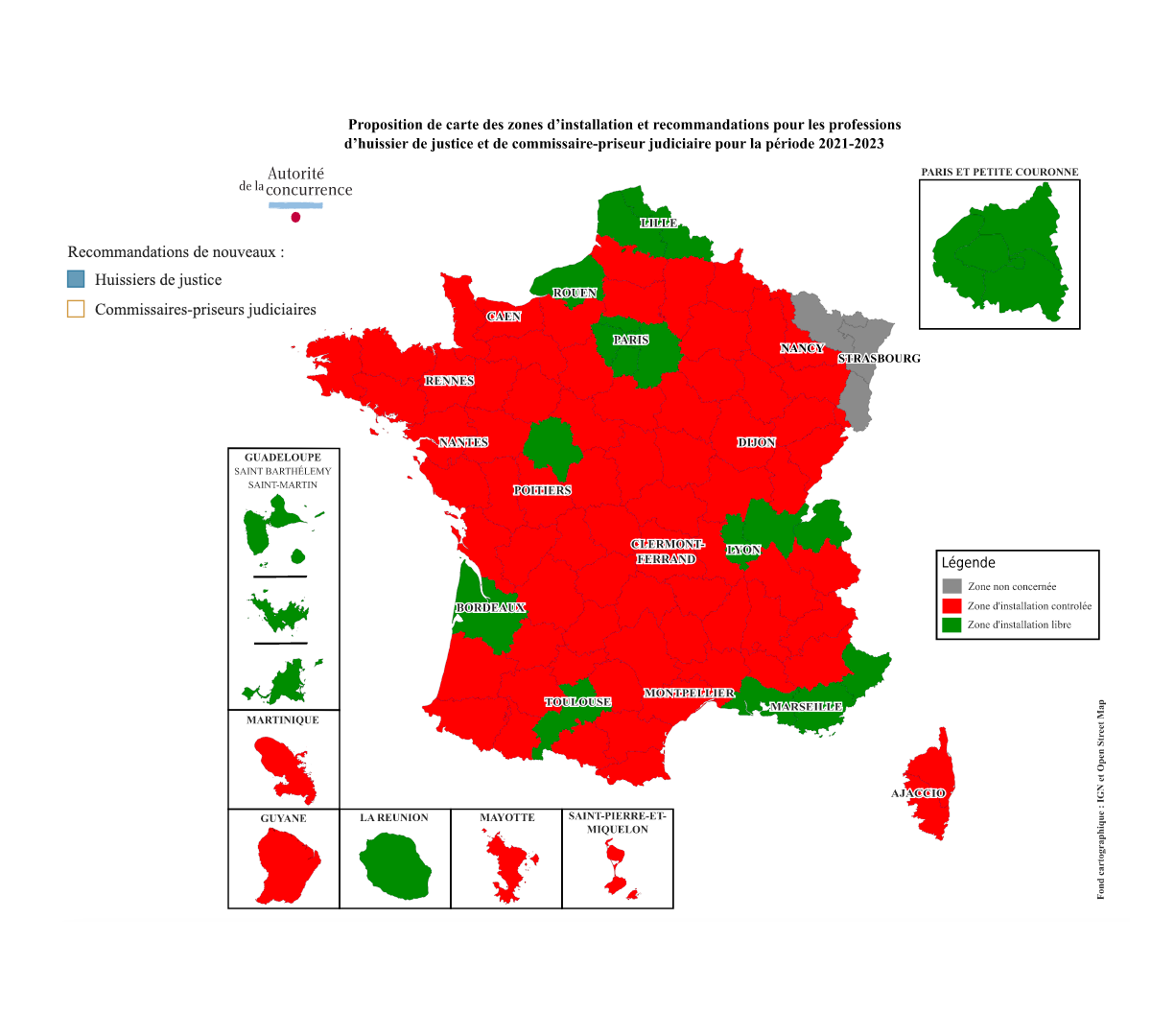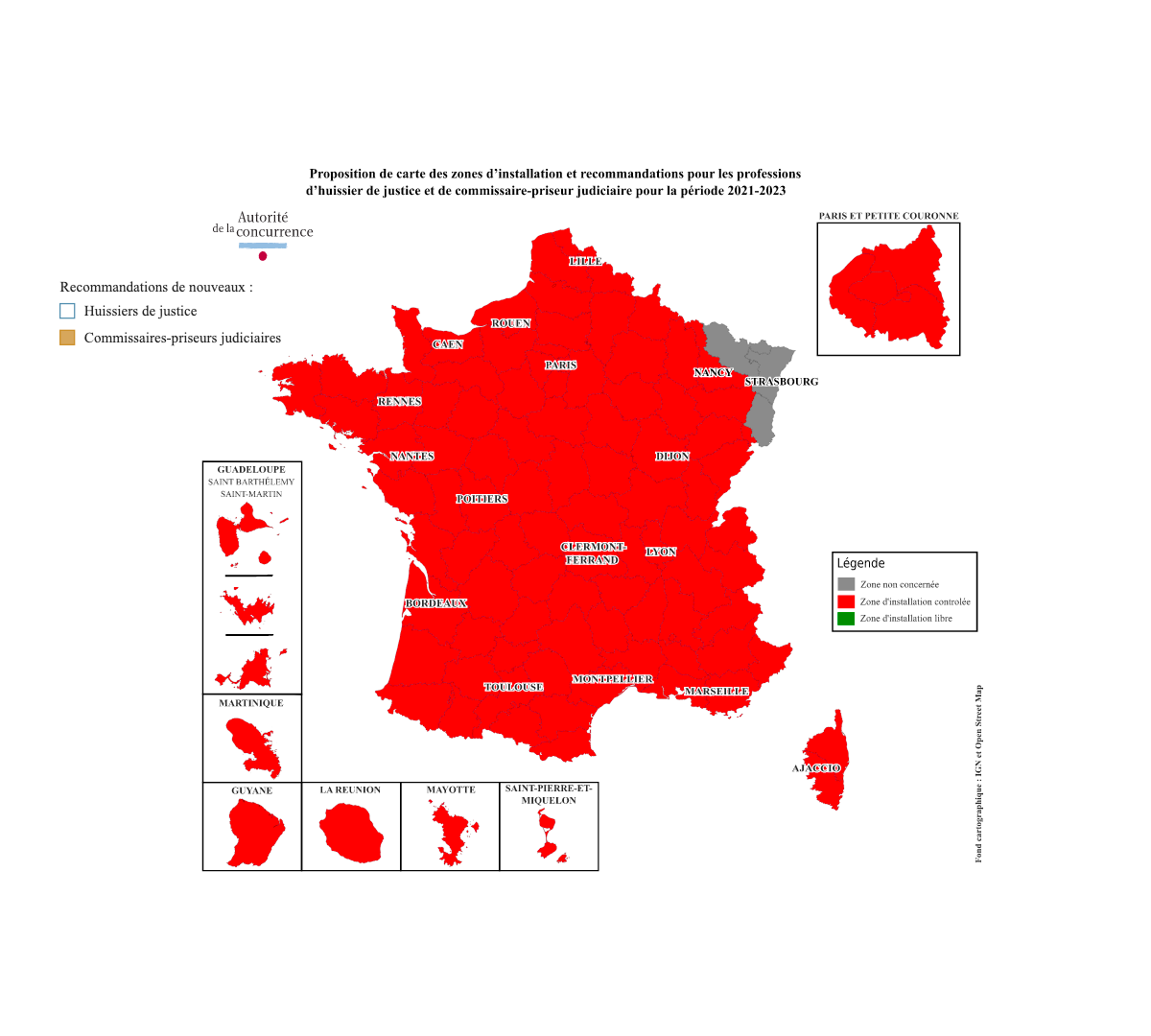Freedom of establishment of notaries, court bailiffs and judicial auctioneers: proposed maps for 2021-2023

Due to the health emergency, the Autorité has taken a particularly cautious approach in developing its proposed map for the establishment of new notaries and overhauling the proposals it issued in December 2019 for court bailiffs and judicial auctioneers.
It therefore recommends the free establishment, by 2023, of 250 new notaries, 50 new court bailiffs and no judicial auctioneers, this last profession having been the most severely affected of the three by the health emergency.
Background
In accordance with Law No 2015-990 of 6 August 2015 on growth, activity and equality of economic opportunities (known as the "Macron Law"), the Autorité de la concurrence is proposing to the Ministers of Justice and the Economy maps of establishment areas for notaries, court bailiffs and judicial auctioneers, together with recommendations on the pace of creation of new offices for the period 2021-2023.
Target for new notary appointments almost reached for the first two maps
The first two maps, 2016-2018 and 2018-2020, had set a target of 1,650 and 733 new notaries to be appointed to created offices, respectively.
In 2019, as in 2016, more than 25,000 applications were registered on the Chancellery's dedicated website, OPM, within the first 24 hours of applications opening. According to the Directorate General for Civil Affairs and Justice (Direction des Affaires Civiles et du Sceau - DACS), there are 33 unfilled appointments under the first map and at least 87 under the second.
New map proposals for court bailiffs and judicial auctioneers
The first maps for the establishment of court bailiffs and judicial auctioneers, 2017-2019, had set a target of 202 and 42 appointments respectively.
In its opinions 19-A-16 and 19-A-17 of 2 December 2019, the Autorité proposed new establishment area maps and recommended the creation of offices allowing the free establishment of 100 court bailiffs and three judicial auctioneers over the validity period of the next map (initially 2020-2022). To these recommendations should be added the remainder from the first maps, i.e. at least 59 court bailiffs and six judicial auctioneers, according to the DACS.
However, the health emergency in March 2020 led the Government to ask the Autorité, by letter dated 22 July 2020, to draw up new proposals for maps for court bailiffs and judicial auctioneers, so as to take into account the implications of the new health context on their economic situation.
The health emergency led the Autorité to adopt a particularly cautious approach
To assess whether and to what extent new offices could be established, the Autorité analysed, as it usually does, a multitude of criteria and parameters reflecting changes in the economy or likely to affect the activity of the professions concerned (e.g. the number of marriages, Civil Partnership Agreements and deaths, as well as developments in the real estate market for notaries, the activity of companies and courts for court bailiffs and judicial auctioneers, etc.).
The Autorité also noted that the health emergency had a negative impact on each of the professions concerned in 2020. This impact was slightly less for notaries than for court bailiffs and judicial auctioneers. Nevertheless, the medium-term consequences of this emergency are still uncertain for all the professions concerned. The Autorité has therefore decided to adopt a particularly cautious approach to the three professions in several respects.
As such:
- the time horizon for evaluating the need for new establishments has been pushed back to 2029;
- the carry-over of the remainder of unfilled appointments to the next map was abandoned on an exceptional basis;
- the speed of convergence towards the long-term establishment goal has been slowed.
The Autorité issues new recommendations for appointments for the period 2021-2023
In accordance with the need for gradual progress anticipated by the Legislator, and taking account of the health emergency, the Autorité recommends that, over the period of validity of the next maps (2021-2023), only 250 new notaries should be established in 112 free establishment areas (out of a total of 293 areas), and only 50 new court bailiffs should be established in 22 free establishment areas (out of a total of 99 areas).
Furthermore, the Autorité recommends that no additional judicial auctioneers be created in the period 2021-2023, given the very serious difficulties faced by this profession in the current health context.
New recommendations for changes to the applicable regulatory framework to improve access to notary offices
As the Minister of Justice is the guarantor of the freedom of establishment of notaries, the Autorité accompanies its proposal for a map for notaries with qualitative recommendations aimed at improving the implementation of the Macron Law, while welcoming the major reforms undertaken over the past five years, and responding to its previous recommendations (electronic drawing of lots procedure, processing of applications for the creation of an office in a controlled establishment area, etc.).
Lastly, the Autorité draws the attention of candidates to the shortening of certain deadlines and the new need to confirm their candidacy after the drawing of lots, otherwise all their applications for appointment to a created office will lapse.
I. A new stage in the application of the provisions of the "Macron Law
A. A third opinion on the freedom of establishment of notaries
- The legislative and regulatory framework
As public and ministerial officers, notaries are appointed by the Minister of Justice to an existing, vacant or established office. The Macron Law introduced a principle of regulated freedom of establishment, with a view to lowering the barriers to entry into the profession and adapting the territorial coverage to the needs of the economy.
Within the framework of this provision, the Autorité's1 mission is to propose to the Government, every two years, a map2 identifying, on the one hand, areas in which the establishment of notaries is effective ("green areas")3 and, on the other hand, areas in which the establishment of notaries is controlled (formerly called "orange areas", now "red areas", to take account of the consequences of a recent amendment to the law)4.
The first map for notaries was proposed by the Autorité in Opinion 16-A-13 of 9 June 2016 and adopted by joint order of the Ministers of Justice and Economy on 16 September 2016 (published in the Official Journal on 20 September 2016) with a target of 1,650 appointments. A second map was proposed by the Autorité in Opinion 18-A-08 of 31 July 2018. Following this proposal, the joint order of 3 December 2018 (published in the Official Journal of 6 December 2018) established 230 free establishment areas (out of a total of 306 areas) in which 733 new free notaries were called upon to establish between December 2018 and December 2020. In accordance with the Autorité's recommendation, the Government has added the balance of unfilled appointments under the first map, estimated at 33 professionals, to the target of 700 notaries proposed by the Autorité.
On 9 March 2021, the DACS counted 697 appointments under the second map (which expired on 4 December 2020) and estimated the balance at 87 unappointed notaries (36 unfulfilled appointments due to the exhaustion of applications and 51 renunciations).
- Overview of the supply and assessment of the creation of offices
The Autorité has updated the delineation of the establishment areas. It has thus integrated the update of the employment areas carried out by INSEE in 2020. In addition, the recent creation of notary offices in Guadeloupe and Martinique, in areas that previously had none, has led to local adjustments. It has reduced the total number of establishment areas from 306 to 293.
As in its previous opinion, the Autorité carried out an overview of the supply and establishment of notaries and observed that:
- the territorial coverage has been strengthened by the first two waves of office creation. Since the beginning of the reform, the total number of free notaries has increased by more than 30% and, according to the statements of the Supreme Council of Notaries (Conseil Supérieur du Notariat - CSN), France now has one notary every 8 km.
- notarial activity grew strongly from 2015 to 2019 (+33% of the profession's overall turnover, excluding Alsace-Moselle, over five years, which passed the €8 billion mark in 2018 compared to €6.5 billion in 2015) and its overall margin rate improved over the period, exceeding 30% in 2017 (compared to 27.5% in 2015).
- the creation of offices since 2017 has not, at this stage, led to a reduction in the activity of the notaries already in position. At most, it has slightly slowed the growth of this activity which has, however, been particularly high, as the above figures show.
In 2020, the Autorité observed that despite an economic shock from March to May (closure of offices, slowdown in real estate activity, etc.), notarial activity remained stable overall: the decline in the profession's overall annual turnover is estimated to be around 3% compared to 2019.
B. An overhaul of the map proposals of December 2019 for court bailiffs and judicial auctioneers
- Background to the Government's request
Under the same mechanism as that applicable to notaries, the first maps for court bailiffs and judicial auctioneers were, on the Autorité's proposal, adopted by two joint orders of the Ministers of Justice and Economy on 28 December 2017 (published in the Official Journal of 30 December 2017).
As the validity of these maps is limited to two years, the Autorité, in its opinions 19-A-16 and 19-A-17 of 2 December 2019, proposed new establishment area maps and recommended the creation of offices allowing the free establishment of 100 new court bailiffs in 32 green areas and three judicial auctioneers in three green areas over the validity period of the next map (initially 2020-2022). These recommendations were to be supplemented by the remainder from the first maps. On 9 March 2021, the latter were evaluated by the DACS at 59 court bailiffs and six judicial auctioneers.
However, on 22 July 2020, the Government asked the Autorité to formulate new map proposals to take into account the consequences for these professions of the health emergency that began in March 2020. Indeed, under the Decree of 26 February 2016 on the establishment of the map introduced in Article 52, I, of Law No 2015-990 of 6 August 2015, the Autorité's proposal is based in particular on "significant changes in the economic situation that have a direct impact on the activity of professionals".
- The impact of the health emergency on court bailiffs and judicial auctioneers
Of the three professions analysed by the Autorité, judicial auctioneers are undoubtedly the ministerial officers who have suffered the most from the health emergency over the past year. In particular, they have suffered from the reduction in the number of collective proceedings, largely due to the public aid that companies are currently receiving to offset the effects of the emergency.
Court bailiffs, for their part, suffered a sharp drop in demand from their principals, due to the disrupted operation of the courts and the suspension of most enforced recovery activities.
In addition, the health context very noticeably complicated the achievement of certain missions of judicial auctioneers and court bailiffs which, contrary to notarial activities, are difficult to computerise. In particular, judicial sales were extremely complicated to organise, if not impossible (the auction rooms had to remain closed during the March-May 2020 lockdown, then from 30 October to 28 November 2020).
II - Quantitative recommendations by the Autorité for the period 2021-2023: 250 new notaries and 50 new court bailiffs
The Autorité decided to continue with the methodology developed in its previous opinions, which has been validated twice by the Council of State and remains fully relevant. Thus, the turnover thresholds used to assess the creation potential in each establishment area remain unchanged.
To take into account the possible short- and medium-term consequences of the health emergency on the professions of notary, court bailiff and judicial auctioneer, which are fraught with uncertainty at this stage, the Autorité decided to adopt an approach which, in several respects, is even more prudent than usual.
- Firstly, the deadline for which it evaluated the need for new establishments was moved back from 2024 to 2029 for notaries, and from 2026 to 2029 for court bailiffs and judicial auctioneers (soon to be merged into the new profession of commissioner of justice). The Autorité will therefore be in a position to reassess the target for the creation of offices on three occasions (in 2023, 2025 and 2027), and reassess the economic and health context during each of these biennial reviews.
- Secondly, while it had been systematically renewed until now, the balance of unfilled appointments from the previous map was exceptionally abandoned.
- Lastly, the speed of convergence towards the long-term establishment goal has been slowed.
On this last point, the Autorité has defined the rate of progress in the creation of offices for the period 2021-2023 by considering three scenarios ("cautious", "lasting emergency" and "very pessimistic"), which vary in their assumptions of the duration and severity of the health emergency . On the basis of the information available to it at the time of drafting this map proposal, the Autorité has envisaged the "lasting emergency" scenario. This choice is supported by the latest health measures adopted in April 2021. The terms of the restrictions currently in force, which are more flexible than those applicable from March to May 2020, as well as the hopes for a way out of the emergency at the end of the current vaccination campaign, particularly justify not selecting the "very pessimistic" scenario.
Thus, in view of the potential for the creation of offices by 2029, which it estimates at between 2,400 and 2,600 new notaries and between 575 and 630 commissioners of justice (i.e. 550 to 600 from court bailiffs and 25 to 30 from judicial auctioneers), the Autorité recommends to the Government the creation of additional offices to allow for, during the validity period of the next map (2021-2023), the establishment of:
- 250 new notaries in 112 free establishment areas (the remaining 181 areas will, therefore, be controlled establishment), compared to the target of 733 notaries for the period 2018-2020;
- 50 new court bailiffs in 22 free establishment areas (the 77 remaining areas will, therefore, be controlled establishment), to be compared with 100 appointments added to the remainder (at least 59 professionals) in its initial proposal;
- no new judicial auctioneers (all the 99 areas will, therefore, be controlled establishment), to be compared with three appointments added to the remainder (at least six professionals) in its initial proposal.
The Autorité recalls that as of 1 July 2022, the professions of court bailiff and judicial auctioneer will be brought together within the new profession of commissioner of justice. Consequently, as of this date, the Minister of Justice will only create offices of commissioners of justice, to which all qualified professionals or "qualified" commissioners of justice may be appointed, regardless of their original profession.
In view of the above, the Autorité proposes the following revised maps (click on the maps to view the interactive version):
III - Recommendations and observations of the Autorité to improve access to offices
In its new opinion on the freedom of establishment of notaries, in accordance with the mission entrusted to it by Article L. 462-4-1 of the French commercial code (Code de commerce), the Autorité is issuing new recommendations to improve access to offices. The Autorité first welcomes a number of reforms undertaken in line with its previous recommendations and then makes nine recommendations for implementation in the next biennium:
- specify the procedures for requests for a transfer of office in the event of a period of delay between the expiry of the previous map and the adoption of the new one;
- clarify the rules applicable to customised requests and make them more flexible to enable professionals to communicate effectively about their services and grow their clientele;
- ensure that the legal framework applicable to the subcontracting and pooling of activities by notary offices takes into account the situation of the offices created;
- invite the Government to submit to Parliament the report provided for in Article 52 VII of the Law of 6 August 2015 on the advisability of extending the application of the freedom of establishment to the départements of Bas-Rhin, Haut-Rhin and Moselle;
- extend the list of data collected by the Autorité under the conditions set out in the Order of 11 September 2018 to the number of deeds by broad categories, the age and gender of office holders or partners, and the location and number of branch offices;
- introduce a tool for monitoring the activity of the branch offices;
- extend the system provided for by Ordinance No. 2015-949 of 31 July 2015 on equal access for men and women within professional orders to the profession of notary;
- reflect on the introduction of a "replacement notary" system, particularly in the case of maternity and paternity leave;
- promote the involvement and representation of the creators of offices in the various representative bodies of the profession and in the inspection functions.
Moreover, within the framework of its new proposals for an establishment map for court bailiffs and judicial auctioneers, the Autorité wishes to draw the attention of professionals and the Government to the consequences of certain recent modifications of regulatory texts on the freedom of establishment of these professionals. In particular, the Autorité notes that, like notaries, these professionals are now subject to stricter procedures for requesting appointments in green areas (shorter deadlines) and for transferring offices (possible opposition from the Minister of Justice).
Lastly, with regard to the three professions, the Autorité draws the attention of candidates to the shortening of certain deadlines and the need to confirm their candidacy after the drawing of lots, otherwise all their applications for appointment to a created office will lapse.
NOTARIES: :
- Access the full text of the Opinion
- Access the table setting out the number of new notaries to be appointed to offices created in the next two-year period by area
COURT BAILIFFS:
- Access the full deliberation adopting a new map proposal
- Access the table setting out the number of new court baillifs to be appointed to offices in the next two-year period by area
JUDICIAL AUCTIONEERS :
1 Article L. 462-4-1 of the French Commercial Code (Code de Commerce) and Article 52 of the Macron Law.
2 The areas concerned cover every département of France, with the exception of Bas-Rhin, Haut-Rhin and Moselle. In overseas France, the départements of Guadeloupe, French Guyana, Martinique, Reunion and Mayotte are all covered, as are the local and regional public authorities of Saint-Barthélemy, Saint-Martin and Saint-Pierre-et-Miquelon.
3 In areas "where the establishment of offices appears useful to reinforce the proximity or the offer of services," the requests of candidates for establishment meeting the envisaged conditions are likely to be accepted, within the limit of the recommended rate of creation.
4 In areas where no need for a new office has been identified a priori, the Minister of Justice may only accept a request for appointment to a new office, on the basis of an opinion from the Autorité, if it is not likely to "jeopardise the continued operation of existing offices and compromise the quality of service provided". Law No. 2020-1672 of 24 December 2020 on the European Public Prosecutor's Office, environmental justice and specialised criminal justice amended the procedure for the creation of offices in these areas. From now on, the opinion of the Autorité will only be sought if the Minister of Justice plans to create an office and no longer in the event that they plan to refuse to do so (which was the most frequent case until now).
Contact(s)



